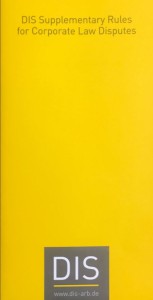 In a recent decision, the Federal Supreme Court (Bundesgerichtshof) has held that shareholder disputes, and in particular challenges to shareholder resolutions (Beschlußmängelstreitigkeiten) in a limited partnership (Kommanditgesellschaft) are arbitrable in principle. The standards governing the arbitrability of disputes of that nature in the limited liability company (GmbH) apply to partnerships as well. The Federal Supreme Court refers to this decision as “Arbitrability III” (“Schiedsfähigkeit III”), so let’s briefly look at “Arbitrability I” and “Arbitrability II” to put this this decision into context:
In a recent decision, the Federal Supreme Court (Bundesgerichtshof) has held that shareholder disputes, and in particular challenges to shareholder resolutions (Beschlußmängelstreitigkeiten) in a limited partnership (Kommanditgesellschaft) are arbitrable in principle. The standards governing the arbitrability of disputes of that nature in the limited liability company (GmbH) apply to partnerships as well. The Federal Supreme Court refers to this decision as “Arbitrability III” (“Schiedsfähigkeit III”), so let’s briefly look at “Arbitrability I” and “Arbitrability II” to put this this decision into context:
“Arbitrability I” and “Arbitrability II”
Back in 1996, the Federal Supreme Court had decided an issue that was hotly debated at the time and held that challenges to shareholder resolutions in a GmbH were not arbitrable (“Arbitrability I” / “Schiedsfähigkeit I”). The Court’s main argument was that decisions potentially declaring a shareholder resolution null and avoid would affect all shareholders (erga omnes effect) and therefore, all shareholders must have had an opportunity to participate in an arbitral process. Back in 1996, however, the court felt that the arbitral process was not able to guarantee the procedural rights of shareholders and decided that these disputes were not arbitrable.
In 2009, the Federal Supreme Court adopted a new approach and held that these disputes were capable of being arbitrated, provided that the aribtral process was designed in such a way as to protect the rights of shareholders. In particular, all shareholders must have an equal say in selecting the arbitrator, and must be kept informed of the process, with a right to intervene. The leading German arbitral institution, Deutsche Institution für Schiedsgerichtsbarkeit (German Institution of Arbitration, DIS), responded to the Court’s new approach by implementing the DIS Supplementary Rules for Corporate Law Disputes 09 (SRCoLD). For all practical purposes, if the arbitration provision in the articles of association is drafted to reflect to the requirements of the Federal Supreme Court in its “Arbitrability II” decision, shareholder disputes are without any exception, arbitrable under German law.
“Arbitrability III”
The recent decision arose in circumstances where shareholders were expelled from a GmbH & Co. KG – a limited liability partnership where the limited partner is a GmbH – a corporate vehicle that is very widely used in Germany. The expelled shareholders challenged the shareholder resolution in arbitration, in line with the KG’s articles of association. The court used the opportunity that this case presented to confirm that the procedural guidelines it had developed in the 2009 decision applied to limited partnerships as well. In the case at hand, however, that meant that the dispute could not be validly referred to arbitration, since the articles of association of the company in question, dating back to 1968, had not been updated and amended to reflect the “Arbitrability II” decision. This case ought to serve as a reminder to shareholders in companies where the articles predate 2009, that a review and update of the articles may be in order.
”Arbitrability IV”?
In its case law so far, the court has now dealt with the arbitrability of shareholder disputes in the GmbH and in the Kommanditgesellschaft. We are on firm ground with arbitraion clauses for these types of legal entities. The Federal Supreme Court has not, however, dealt with the arbitrability of shareholder disputes in a stock corporation (Aktiengesellschaft). With respect to listed stock corporations, there is a broad consensus that arbitration is not an option for these. Section 23 para. 5 Stock Corporation Act (Aktiengesetz) prohibits deviations of the articles of association from the provisions of the Stock Corporation Act. Since the Stock Corporation Act provides for challenges to shareholder resolutions to be brought in the state courts, including an arbitration provision instead into the articles is deemed a violation of Section 23 para. 5 Stock Corporation Law and hence invalid. Whether the same is true for small stock corporations which are not listed and rather “private” than “public” in nature is a matter of debate, however. Hence, there is definitely scope for “Arbitrability IV” in the event that such a dispute reaches the Federal Supreme Court.
A somewhat more technical and slightly extended German language version of this post can be found at zpoblog.de.
***
Bundesgerichtshof, order (Beschluss) dated April 6, 2017 – I ZB 23/16 „Schiedsfähigkeit III“ and order dated the same day in the parallel matter – I ZB 32/16.
